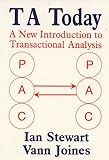 Category: TA Psychotherapy.
Category: TA Psychotherapy.
Target audience: TA novice – expert.
How challenging is it to read? Most of it accessible – some bits for more experienced TA practitioners.
Clients often ask me to recommend one book they can read to increase their Transactional Analysis knowledge when I work with them delivering therapy. TA today is that book. It has been the standard text book of Transactional Analysis trainees now for many years, mainly because it is well written, comprehensive and understandable. There are parts of the book that are targeted at the more advanced practitioner but if you don’t understand those sections straight away they will open up to you as you become more knowledgeable. The book includes exercises at the end of each section to engage the reader, but there are no answers anywhere so you determine the correct answers by reading the book. Most of the exercises are self reflective anyway, so only you know the correct answer! This in not exactly a bed time reading book (though as a TA geek I have often treated it as such) due to its text book like density, but what it lacks in entertainment factor it makes up in thoroughness.
I’m not going to go into the contents of the book here because it would require me to list all of the major ideas and concepts contained within TA. Suffice to say that they are all in there! Some could argue that the book is starting to show its age too, it was written in 1987, but as it is a basics book I don’t think that matters.
One question that comes up now and again is why this book is a better read for those new to Transactional Analysis than Transactional Analysis in Psychotherapy by Eric Berne (the Author of Games People Play)? After all, it was Berne who founded TA. The answer is two fold. Firstly, TA has moved on and developed since Berne. There are many other important contributors to the theory since Eric laid the foundations and all of these extras are included in TA Today. Secondly, Berne’s books are far from straight forward to read, maybe with the exception of Games People Play: The Psychology of Human Relationships. The others can be dense and certainly not recommended for the casual peruser! I like to look on them as personal challenges, a bit like climbers may view Mount Snowden (they are not quite in Everest territory).
So if it’s Transactional Analysis basics your after, TA Today : A New Introduction to Transactional Analysis is a great starting point, a comfortable meander over rolling hills maybe?
If you’ve enjoyed this review, or disagree in any way, please comment below.
Buy the book: TA Today : A New Introduction to Transactional Analysis Click on the (affiliate) link to be taken straight to amazon. This will get you the right edition of the book instantly!

 Transactional Analysis is one way of understanding human personality. It was the brainchild of Eric Berne who trained as a psychoanalyst but became disillusioned with the methods he was expected to follow and wanted a more equal approach to the therapist/client relationship.
Transactional Analysis is one way of understanding human personality. It was the brainchild of Eric Berne who trained as a psychoanalyst but became disillusioned with the methods he was expected to follow and wanted a more equal approach to the therapist/client relationship.